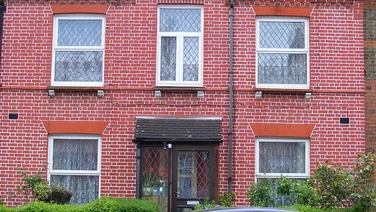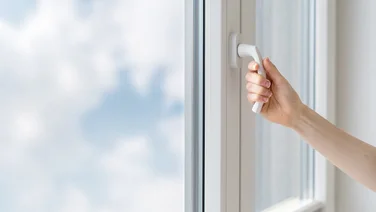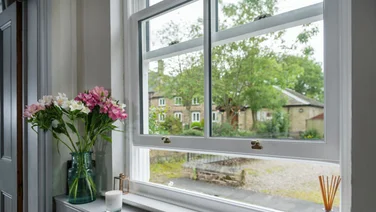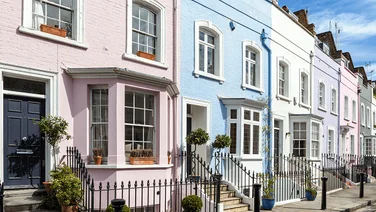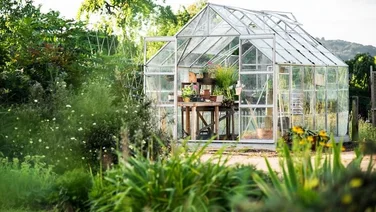We receive a small fee from trusted installers when you request a quote through our site. This helps us keep our content independent, well-researched and up to date – Learn more
- Double glazing can save you £140 per year on your energy bills
- It can also add up to 10% to your home’s value
- At least 88% of English homes have double glazing

Adding double glazing to your home can save you around £140 per year on energy bills, according to the Energy Saving Trust. They can also add around 10% to the ticket price of your home while also saving you around 380 kg in carbon emissions.
The price of double glazing is high, but it’s a constant in modern homes for good reason. It’s therefore worth considering whether the benefits outweigh the short-term costs – and fortunately, we can help you do just that.
If you’re keen to benefit from your new windows as soon as possible, just fill in this form to receive free quotes for double glazing from our trusted suppliers.
What type of double glazing do you need?
Get startedWhat is double glazing?
from materials like uPVC, wood, aluminium, or steel. The panes are separated by a gap of between 12mm and 16mm (sometimes smaller or larger), filled with either air or an inert gas such as argon, krypton, or xenon.
Any filler gas that isn’t air tends to be denser than air and conducts heat more slowly, helping your home stay warmer for longer. Many double-glazed units also use low-emissivity (low-E) glass, which has a virtually invisible coating of metal oxide. This composite of materials acts like a thermos flask, reflecting heat back into the room and keeping temperatures stable year-round, regardless of the outside temperature.
The purpose of double glazing is to make the windows more energy efficient and cut down the amount of heat the house loses, which in turn should bring down your energy bills.
If you want to know how much new windows might set you back, look at our double glazing cost calculator.
When it comes to frames, there are four main options: uPVC, wood, aluminium, and steel. uPVC is the most common choice, offering excellent energy efficiency, weatherproofing, and low maintenance. Its main drawback is aesthetics, though this can be offset with finishes such as an aluminium shell or a wood-effect coating.
Wooden frames, on the other hand, are highly sustainable, recyclable, and naturally insulating since they don’t conduct heat. However, they need much more maintenance than uPVC to prevent rotting and to stay in good condition.
Aluminium frames are strong and stylish, but they’re also highly conductive, which means they lose heat in winter and absorb excess heat in summer compared to wood or uPVC.
If you’re unsure about what type of windows to get, have a look at our triple glazing vs double glazing guide.
Steel performs a little better than aluminium in this regard, but it’s still less efficient than wood or uPVC, and as the most expensive option, it tends to be chosen for its distinctive look rather than performance. The good news is that all four frame types can be recycled, so you’re not locked into a high environmental cost whichever you choose.
Finally, beyond frame material, it’s crucial to look at the energy rating of the windows themselves. The British Fenestration Rating Council (BFRC) grades windows from E up to A++, taking into account draught-proofing, heat retention, and solar gain.
If you’re serious about lowering energy bills, A++ is the rating to go for the best efficiency and the quickest return on investment.
Is double glazing worth it?
Yes, double glazing and its costs are worth it. This is for a variety of reasons, including, but not limited to:
- It can cut your energy bills by around £140 per year.
- Provides an immediate return on investment.
- Adds up to 10% to your home’s value, making it easier to sell.
- Offers benefits homebuyers expect:
- Warmer rooms
- Lower carbon footprint
- Reduced outside noise
What are the benefits of double glazing?
- Lower energy bills
- A warmer home
- Less outside noise
- A less draughty home
- Reduced risk of condensation buildup in the winter
- A reduced carbon footprint
- A more secure home
- A more valuable home that’s more attractive to buyers
- Good double glazing, especially low-e glass, can also reduce light damage to your furniture, pictures, etc from UV rays
What type of double glazing do you need?
Get startedHow much money will double glazing save me?
Double glazing can save the average UK home £140 per year on its energy bills. Whatever your situation, replacing single glazing with double glazing – even in just one window – will immediately cut your energy bills.
It’s simply a more efficient version of your old windows, and practically perfect in every way.
Can’t afford to fork out a few thousand pounds for a new set of windows? You could also look into draught proofing your windows to cut back on costs.
If you’re interested in financial help, including double-glazing grants for over-60s, have a look at our guide.
| Double glazing efficiency rating | Potential cost savings per year | Potential cost savings in 20 years |
|---|---|---|
| A+-rated double glazing | £150 | £2,700 |
| A++ rated double glazing | £140 | £3,000 |
*Data courtesy of Lotus Windows
When will I break even on double glazing?
On average, it takes between 27 and 50 years to break even on any outlay you make for double glazing. The exact payback period depends on the type of glazing you install, the exact savings you make on heating, and the property appreciation rate of your area.
Given that double glazing can also increase the price of your home by 10%, at some point in the future, your investment is likely to pay off in a big way. And for many prospective homebuyers, a house’s lack of double glazing is an immediate dealbreaker.
This is because double glazing doesn’t just save you money on energy bills. It also benefits you in ways that can be hard to quantify in financial terms, but which make a significant impact on your everyday life.
For instance, double glazing is much better than single glazing at keeping out the sounds of the outside world, typically reducing the noise level from outside to inside to between 35 and 40dB. To put that into perspective, 35db is roughly comparable to a whisper or rustling leaves.
Will double glazing cut my carbon footprint?
Yes, absolutely. Double glazing can reduce your annual carbon emissions by up to 380 kg of CO2, according to the Energy Saving Trust. That’s the same amount of CO2 you emit by driving 1,389 miles, according to Our World in Data.
Keeping more energy inside your home, instead of releasing it into the atmosphere, will always benefit the climate and your wallet. Want to make your house even more energy efficient? You could consider getting triple glazing.
Go to our page to find out which is better, triple glazing or double glazing.
Are there government grants for double glazing?
There are no government grants currently available specifically for installing double glazing, unfortunately.
However, various home upgrade grants are available that can, in part, be used to help with the cost of double glazing. These include, but are not limited to:
| Scheme / Initiative | Region | What’s Covered | Eligibility Highlights |
|---|---|---|---|
| ECO4 / Warm Homes Local Grant | England, Scotland, Wales | Double glazing & other energy upgrades | Low-income or fuel-poor households |
| Home Energy Scotland Loan | Scotland | Interest-free loan for glazing | General Scottish homeowners |
| Affordable Warmth Scheme | Northern Ireland | Draught-proofing & window upgrades | Households under £23,000 income |
| Interest-free loans / Partial grants | UK-wide | Up to £8k loans or 75% grants | Varies by scheme and region |
| Warm Homes Plan | UK (via councils) | Double glazing, insulation, heating | Low-income households |
| Social Housing Decarbonisation Fund | UK (social housing) | Windows, insulation, heating retrofits | Social housing tenants |
| Help 2 Buy Windows (private) | UK | Full/partial glazing grants (private) | Based on provider’s own criteria |
That all said, make sure you get in touch with your local authority, as they may be able to offer grants to help you pay for double glazing.
And although they won’t subsidise your double glazing costs, schemes like the Energy Companies Obligation, Nest, Housing Aid for Older People Scheme, or Boiler Replacement Scheme could also help you to heat your home more efficiently (depending on where in Britain you live).
Summary
- Double glazing can save you around £140 a year on energy bills while cutting carbon emissions by up to 380 kg annually.
- It adds up to 10% to your home’s value, making it more attractive to future buyers.
- Beyond the numbers, you’ll enjoy a warmer, quieter, and more secure home every day.
- Although upfront costs are high, the long-term financial and lifestyle benefits outweigh the investment.
- With a range of loans and grants available across the UK, upgrading your windows could be more affordable than you think.


